Designer Kunrui Peng has developed a blow-up toilet that weighs less than one kilogram and can be carried on hikes to prevent human waste from spoiling the wilderness.
Peng designed AirPot as an alternative to burying faeces in the ground, which is now known to leave lasting impacts on the environment.
"I came up with this idea after discovering some irresponsible 'remains' deep in the forest while out hiking with my mother," the designer told Dezeen.
"Since then, I have been researching their impact and harm besides being an eyesore and trying to find a solution."
Peng's research for the project, which was undertaken during his final year of studies at the Muthesius University of Fine Arts and Design in Kiel, Germany, referenced data showing that in 2022 there were 59.6 million hikers in the US alone.
The growing popularity of outdoor pursuits can lead to issues around responsible toileting, which prompted him to propose a novel design solution.
AirPot's inflatable seat is accompanied by a plastic pot and biodegradable toilet bags, which together form a compact and lightweight kit that weights less than one kilogram.
The seat is easily mounted by waving it in the air to inflate, rolling up the opening to seal it and folding the inflated form into a U-shape.
The two ends clip together and the pot slots in the centre. The toilet bag is pushed inside the pot and attaches to four buttons on the surface of the seat.
The bags contain a powder invented by US space agency NASA that instantly solidifies human waste and breaks down bacteria and odours. The bags can then be taken to human waste collecting facilities for disposal.
AirPot's seat and the toilet pot both have a gentle 15-degree angle that helps to enhance comfort when sitting and makes it easier to get up.
Peng used a PU-coated polyester typically used for tents and waterproof covers for the upper part of the inflatable seat while the bottom section is made from durable PU-coated nylon.
The materials were chosen for their airtight and watertight properties, as well as for their ability to be easily cleaned.
Peng hopes the product will one day be manufactured and made available to the public.
"AirPot is the best solution for me because it can solve the problem and provide a great experience," he explained. "It is a much more comfortable way to toilet in the wilderness and is easy to transport and use."
"People will do the right thing when given a well-designed tool to improve a situation," the designer added. "After all, people often go to the wilderness because they love nature."
AirPot was presented at Dutch Design Week 2024 as part of the exhibition The Magic Touch: Designing Togetherness, which showcased work by design graduates from various German universities.
Dezeen has rounded up six key trends from this year's festival including polluted materials and decentralised heating solutions. A 3D printing filament made from leftover date pits and a chair with collapsible arms for airing out clothes are among our other highlights.
Dutch Design Week 2024 takes place in Eindhoven from 19 to 27 October. See Dezeen Events Guide for an up-to-date list of architecture and design events taking place around the world.

